Newton
Nestore Mangone & Simone Luciani, Cranio Creations, CMON Games
Great googly-moogly, where does the time go? I started 2024 with the idea that I would get back into regularly updating the website, but somehow it is September and I think I have managed to complete a single update? Yikes! Oh, well. I haven’t successfully invented a time machine, so I guess the best time to do something I should have done yesterday is today.
If you can’t tell by now, I have a tendency to gravitate towards complex games that have lots of bits. There are definitely games I fully understand in one play and will go back to over and over (looking at you, NaNa), but I love ones where it takes me 3 or more plays to experience everything the game offers.
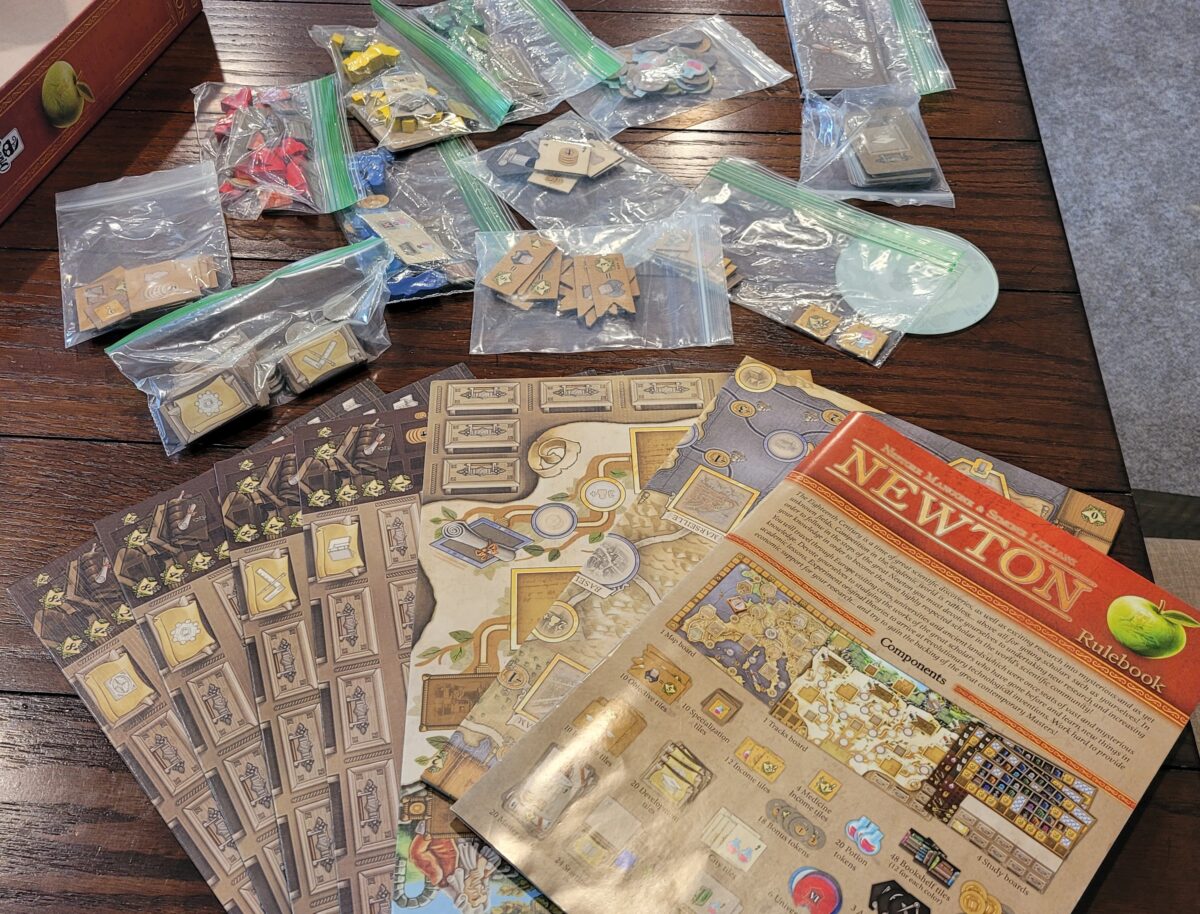
Newton is one of those, and that can be intimidating to new players. In some ways, Newton looks more complex than it actually is. The box is full of boards and tokens and cards and more boards and more tokens and, finally, more tokens. Because I unboxed this game during the COVID shutdown, I can’t remember how many punch boards it included, but given the amount of space left on the top of the box after packing, I can safely say it was more than average. If I recall correctly, it took me several plays to even decide on an effective organization for the parts to facilitate setup.
I could spend the rest of this post going on about the best part of getting a new game (punching out the tokens, then organizing everything), but let’s get into it.
Theme
The description of the game from the front page of the rulebook promises a lot:
The Eighteenth Century is a time of great scientific discoveries, as well as exciting research into mysterious and as yet unknown fields. Competiton in the academic world is ruthless… above all for young scholars such as yourselves! In order to follow in the steps of the great Newton you must devote yourselves to undertaking new research and increasing your knowledge in order to become the most highly respected scholar in the world’s scientific community.
You will travel through Europe visiting cities, universities and ancient lands that were once seats of vast and mysterious knowledge. Devote yourselves to studying the works of the great scholars who have gone before and learn new things in academic lessons. Experiment original theories to arrive at revolutionary technological inventions. Work hard to provide economic support for your research…. and try to gain the backing of the great contemporary Masters!
The game delivers on most of what it describes, even if it embellishes the details of how you go about it. There aren’t any specific technologies or scientific breakthroughs to discover. Instead, the ultimate goal of the game is to reach one or more of the many different end game scoring conditions. Sure, there are games out there that have randomized end game scoring goals to change the focus of each game, but in those cases, you’re establishing the scoring for all the players. In Newton, several end game scoring conditions are randomly selected and placed during setup, but then each player has to work towards the scoring condition(s) they want to use for themselves. This means, depending on a player’s selected strategy, their final scoring could look very different than the other players.
All the components and even the colors used on the boards and tokens are in support of the Eighteenth Century theme of the game. It’s a very “brown” game, and as we all know, games set in the past have to be “brown.” I say that semi-jokingly, but for the most part, the coloration works. There are some cases where the designers could have used something other than different shades of tan, brown, yellow, and gray to differentiate where tokens should be placed during setup. Even the Master cards included in the game are influenced by what each of those scholars accomplished in their life, generalized for the mechanics of Newton, of course.
Setup
Newton takes up quite a bit of space. There are two community boards where most of the mechanics are played out and each player also receives their own board where they will track their knowledge, resources, and their actions each round. Placement of all tokens in the game are randomized during setup. There will be unused tokens at the end of setup of the two community boards.
The Map board is set up as follows: randomly place the ancient lands, universities, and city tiles on the board based on their shape. Place bonus tokens on the gold-bordered small circles located on the routes between each of the location tiles based on the number of players. Place all of the Medicine income tiles on the space with the caduceus in the upper right of the Map board. Place one of the flat, round player markers at the start of the scoring track. Place one of the Objective tiles in the reserved spot (below the Medicine reserve). Each player then places their Scientist meeple on the city of Basel in the center of the map.
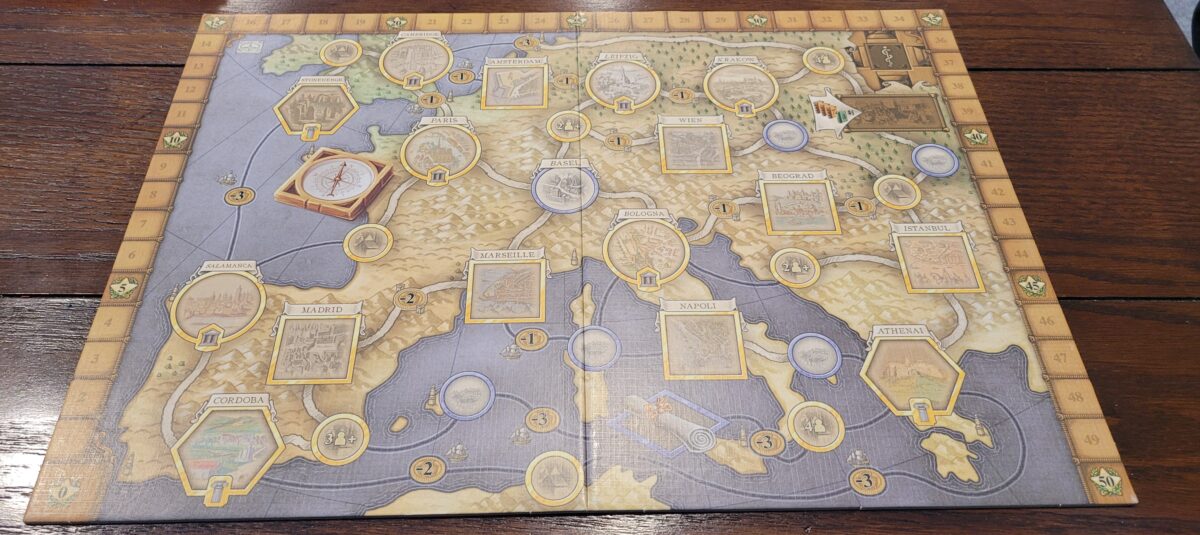
The Tracks board is a bit more complicated. Randomly place Invention tiles (large squares with a notch cut out of the upper left corner) on their reserved spaces on the Work and Technology portions of the board. Do the same with Objective, Specialization, and Bonus tiles in the same manner, paying attention to any locations restricted by player number (bonus tiles only on the gold ringed spots). Stack the Development and Income tiles (sorted by icon) on the five drawers on the bottom right and the three squares on the bottom left, respectively. Each player then places a single Student meeple in the box at the bottom center of the Tracks board and their second round player marker on the Work track (top portion of this board).
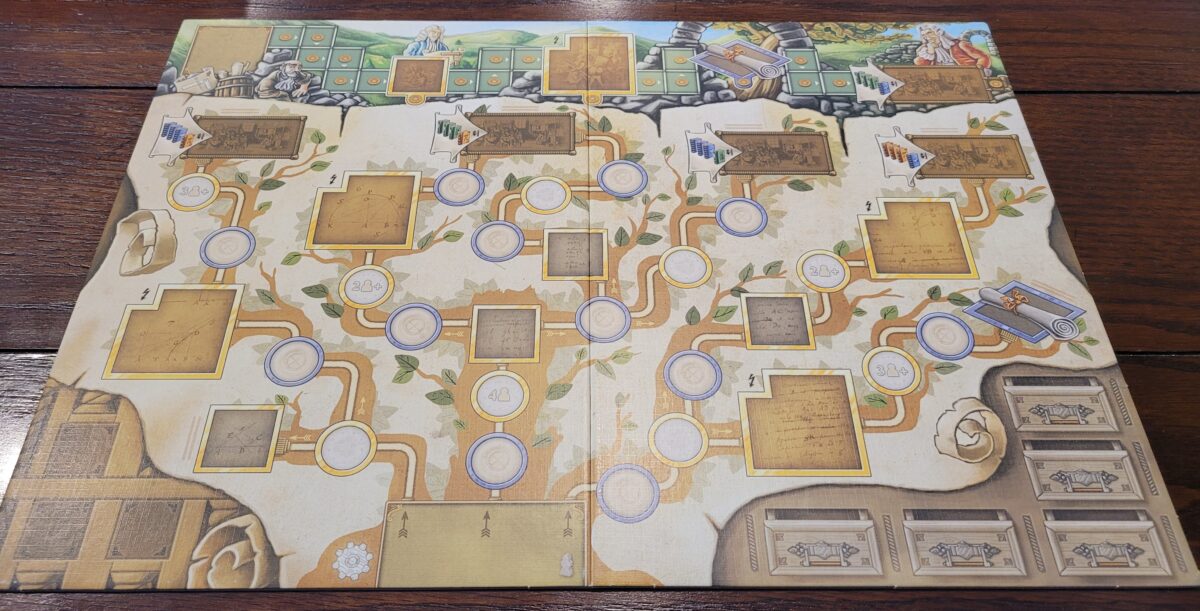
Sort the Action cards by the icons on their back, and then each pile is shuffled. A market is then established based on the number of players. Create a common supply of coins and potions.
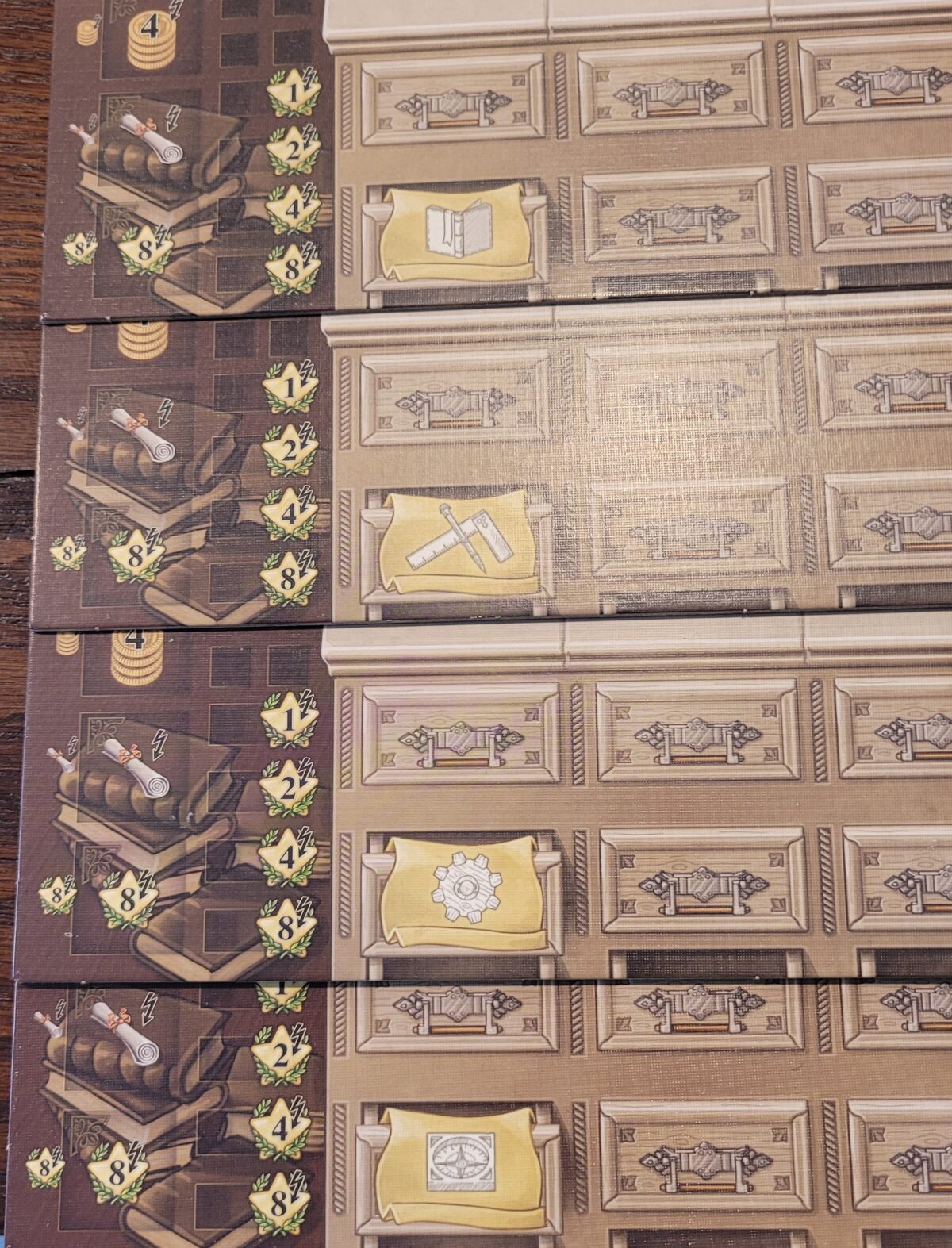
Each player sets up their own board by dividing their Bookshelf tiles evenly into four stacks covering the four icons on the bottom left of their board (Potion, Money, Master, Points). Place a single Travel marker (small square cube) over each of the reserved spaces between their Bookshelf tile reserve and their play area (the table with drawers). The remaining 3 Student meeples are set aside for use later. Each player should then take their reserved starting Action cards (based on the color and shape on their back), a Summary tile (player aid), and 2 coins. Each player will be dealt 4 Master cards randomly. The instructions then recommend drafting a single Master, then passing the remaining cards to the left, repeating this until players have drafted 4; however, given the iconography-heavy nature of the game, drafting Master cards might take a significant amount of time as the players pass around the instructions to understand each of the cards they could choose from.
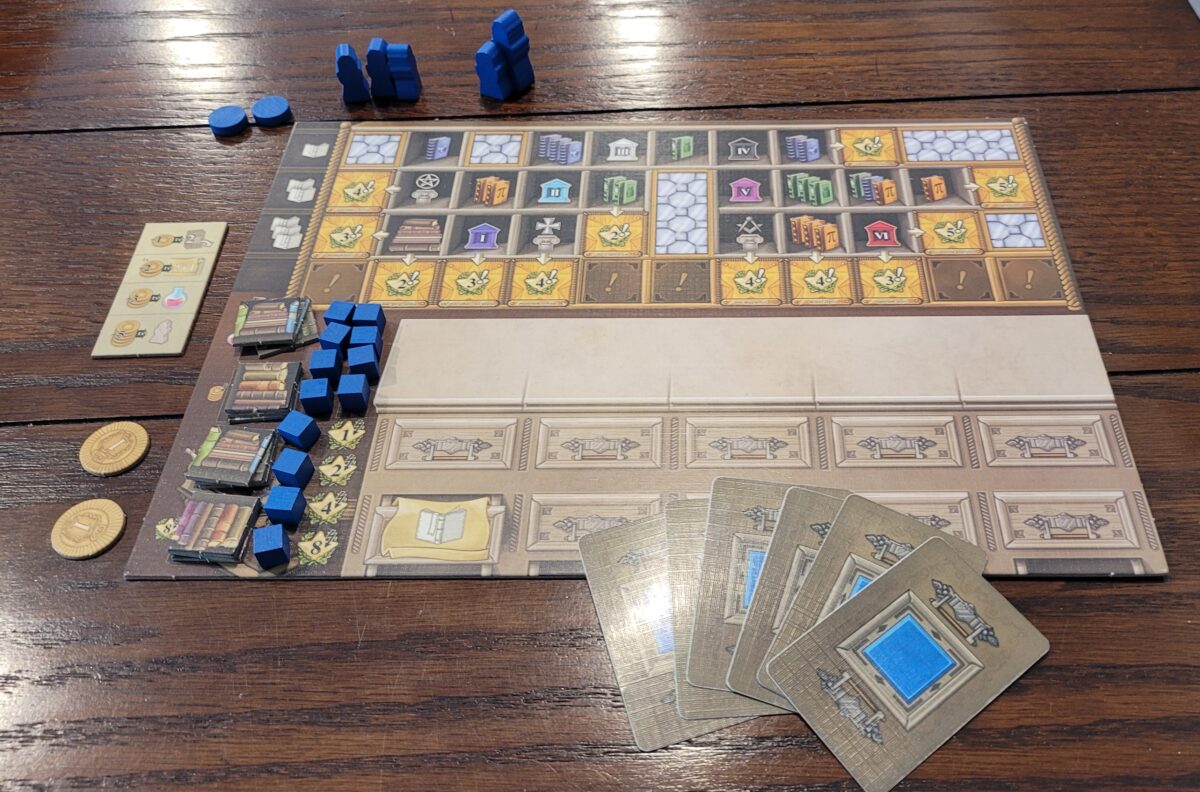
Setup is complete. For the most part, each of the tiles and tokens can only “fit” in certain designated spaces on the boards, removing confusion. The exception to this Income and Specialization tiles. Their shape and size similarities can make them difficult to differentiate from each other.
General Rules
Newton is played across 6 rounds, each of which is comprised by five turns. The first player token will rotate clockwise between rounds. The game ends when the final player completes their fifth turn on the 6th round. Scoring will always include points accumulated during the game (using Action cards, etc.) and any Master cards played, but each player must then calculate additional points based on which Objectives they have achieved during the game.
On each of their turns, players will choose an Action card place it on the desk of their player board. The strength of the played Action is based on the number of the icons to the left of that Action card (i.e., already played cards granting the same action). Each player’s board is identical with the exception of a single pre-printed Development Action in the play area. Developments in this row of the same type should be included in the calculation of the strength of the played Action and there are ways to add more Developments to this row as the game plays out. At the end of a round, players must choose one of the Action cards they played that round and slide it under their board until only the Action icon at the bottom is visible. The selected card’s Action (and any bonuses it might have contained) are lost to that player for the remainder of the game, but that Action icon is now added to any further Action cards played of the same type. It should be noted here that players can always choose to take an Action at a lesser strength, should they choose.
The Actions available to players are: Work, Technology, Travel, Lessons, Study, and Joker (wild). Objective tiles can only be achieved if the player has met all of the requirements of that Objective during that round, meaning the books required must be on the players desk (played) at the time they attempt to claim that Objective and not just in their hand.
Players also have access to a series of free actions that do not count against the single Action they can play on a given turn. Potions can be used to supplement Action cards for meeting any prerequisites in the game and Potions can be purchased for 3 coins. A played Action card can be made 1 stronger by paying 2 coins (this can only be used once for each Action). Other free actions will be discussed in the sections where they are applicable.
Work is the easiest to understand and is the primary way of earning income. The player moves their marker along the Work track the number of spaces equal to the number of Work Action icons on the desk of their board. Gain a coin for each space moved over. The Specialization, Invention, and Master spaces can only be used if the player stops on them, but they also gain a coin these spaces as well (which can easily be overlooked due to the iconography of this section).
Technology is the primary path with which a player makes their personal player board stronger. The player moves their Student along one of the three tracks, collecting any passed over bonus tokens and gaining their benefits immediately. As with the Work track, players must stop on Specialization, Invention, and Master spaces to claim their benefits (but not bonus tokens). Students cannot move backwards along the Technology track, so when a Student reaches the end of their branch, they are left in place as a marker for use in scoring (if applicable). Players can pay 5 coins to add a new Student meeple to the starting area of this board as a free action.
Travel is the primary path for meeting prerequisites for the Study action (discussed below). The player moves their Scientist along one of the paths of the Map board, paying any requisite coin tolls and collecting any available bonus tokens they pass over. The Scientist must stop on an Ancient Ruin, University, or City tile to gain the benefit (sensing a theme yet?). If ending on one of these locations, the player removes a Travel marker from their board (small colored cubes) and places it on their location at the end of their Action. If the removal of this cube would grant points, gain them immediately on the scoring track. As with the other tracks, players must be able to meet the prerequisites to move across a toll (i.e., have enough money at the time of the move) or enter the Objective tile.
Lessons is the primary path for gaining new Action cards. Since players will lose access to one of their Action cards at the end of each Round, players must gain at least one new card per Round to offset this. When taking this Action, the player takes a single card from the market. The only restriction for this is that the card taken must have a number of Icons on its back equal to or less than the strength of the Lessons action taken. This card is added to the players hand and is immediately available for use. Action cards obtained from the market tend to have powerful instant benefits when played or contain books that can be used to meet the prerequisites for entering Objective tiles. The rulebook has a good explanation of every specialized Action card and how to use it.
Study is the primary path for scoring points during the game and is by far the hardest action for players to understand. At the top of each player’s board is a library. The library area is made up of a series of boxes, each containing icons of ancient lands, universities, cities, and books of various combinations. When a player takes the Study Action, they move a single bookshelf tile from the bottom left of their player board and move it to the library area. They are allowed to cover one box in the library that is on the row equal to or less than the strength of their Study Action (the number of Action icons, shown on the left side of the library) and where they meet the requirements.
The bookshelf tiles must be taken in order from top to bottom from the supply and the player gains a bonus as each stack is removed immediately upon exposing the bonus. The requirements on the library box being covered by the bookshelf tile must be met at the time of the Study Action. This means, the books required to meet a box’s requirements must be in the play area and, in the case where the requirement is a location from the Map, the player must have placed one of their travel cubes on that location. As a free action, players can use a single potion to replace a single book requirement or three potions to replace any requirement in the library.
Players should focus on completing rows and columns in the library, as these will score at the end of each round (as discussed in the End of Round section below).
Joker can be used to take an Action for which the player has no other Action cards (or chooses not to). The joker card is treated as though it has that Action icon for the purposes of this Action only. This means, it gains any benefits from other Action icons of the same type when calculating its strength, but later actions of that type will not benefit from the joker. For all intents and purposes, after it is played, it is treated as a blank card for calculating action strength until the round is complete and a player uses it in subsequent rounds. This also means that players should not tuck their joker card at the end of a round unless they feel they have no other choice, since the joker icon cannot be used in calculating strength for Actions played after.
End of Round. Once all Actions have been played in a round, there is a cleanup and scoring phase before the first player marker rotates clockwise for the next round. This includes players choosing one of their cards to tuck from the cards played in that round (not their hand) and adding any points earned from their own libraries. Each row and column of the library has a point value that, when the row is completed with bookshelf tiles, the player should add to their score at this point. Players could also potentially be gaining potions, coins, and points from Income tiles they have gained through actions in previous turns of the game.
Components
Newton comes with quite a few pieces, all of which are of what I would consider standard quality.
The Map and Tracks boards are each a single fold and, when placed together in the recommended configuration, take up quite a bit of a standard table; however, because they are separate boards, there is more flexibility in how the table can be arranged than if everything had been included in a single board. Player boards are thick cardboard and, while it would have been nice for these to be dual-layered to keep pieces from sliding around, it isn’t necessary. Tokens taken from the player boards are always taken in a specific order, so it is relatively easy to restore a bumped board to it’s pre-impact condition.
The meeples are wood and feel like good quality. My copy was free from defects, but I know from experience that wooden meeple quality can vary wildly.
All coins, potions, and randomized tokens, objectives, locations, and specializations are cardboard. The game comes with very few bags for organizing and there is no insert in the box. I ended up separating out player pieces by color and starting cards, and using Ziplock-style bags to otherwise separate and store pieces to prevent them from sliding loose in the box.
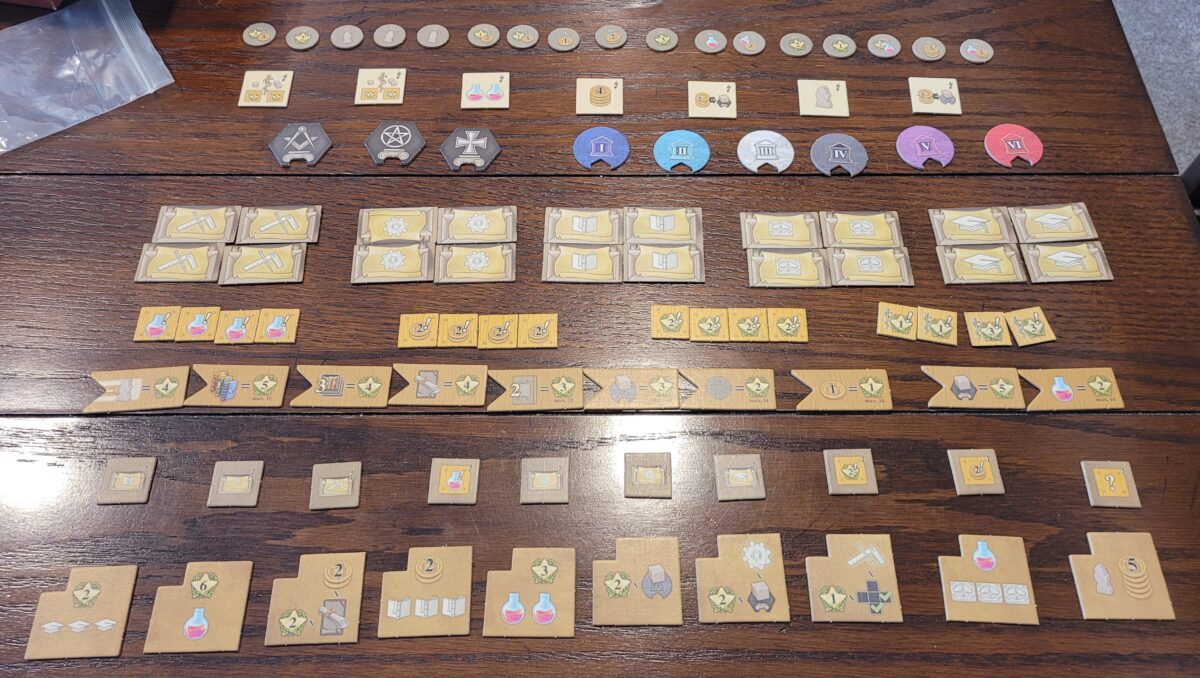
Play
Newton is pretty quick once players understand the basic mechanics. The first few games I played, everyone focused on building an engine and gaining momentum, but then the game was over and point scores were low (50’s). It wasn’t until we understood that the majority of the game should be played in the Library that scores went up. It is fairly common that a new player in a game with experienced folks may find their score significantly lower due to getting distracted (investing in too many strategies instead of specializing) or playing second fiddle to another player’s strategy (second place on the same path, getting no bonuses, fewer cards, etc.). The end-game scoring threw a few people for a loop in early play-throughs, where someone would work towards an Objective, claim it, but then fail to accumulate the resource required to score that objective, earning no points but investing a ton of time and resources.
After moving up on the learning curve, players can often chain Action cards with bonuses in meaningful and powerful ways that allow them to capitalize greatly on any single strategy. The only “go-to” strategy I have been able to determine is that players should find ways to support their ability to perform the Study Action, since the library is such a strong source of victory points through the game.
For example, a player may choose to focus on the Work action because the Objective at the end of the track is where they want to focus. They can also rely on the money they make through Work to support stronger actions (at 2 coins to improve the strength of an Action by one), or to purchase potions (3 coins) and Students (5 coins). Because the work track is limited and there is no way to go backwards or add another tracker, it is possible to extinguish this as a viable action within a round or two of the game, cutting the player off from this strategy after heavily investing their resources. This can be offset by the player taking Lessons actions to claim Action cards that directly grant money when played or allow money to be converted directly into points to maximize the use of these coins and keep a steady income through the game. They could also focus on claiming Income tiles that grant potions and coins at the end each round and identifying and claiming any easily reached Specializations to improve their desk Actions. This, of course, means that sacrifices have to be made elsewhere, but this player could then use their coins to claim potions, which can then be used to offset requirements in the library when taking a Study action, minimizing the amount of time they have to spend strengthening the Study Action in their hand and on their board.
A different player in the same game may choose to ignore the Objectives entirely, and focus all their efforts on gaining points through their library. They claim Action cards that have books and grant potions, so they can meet the requirements they need as early as possible. This player would potentially be in direct competition with the Work player in the previous example, since they would want Action cards that grant money as well (since it can be converted to potions easily enough).
I think the most common mistake I have made when playing this game is when I forget to closely examine the board during setup and the opening round. The most important thing a player can do is look at the Objectives and the paths to achieving them. Which Objectives are on paths that support that objective? Is the Objective for points per Student at the end of a technology research branch in the Technology section of the Tracks board? Is the Objective for scoring points for the number of coins at the end of the game on the Map board?
The second most common mistake I have made is forgetting that each of the Objectives have limits on the maximum number of points that can be claimed from that Objective. Some are inherently limited, since they may grant points based on a finite number of locations/spaces that can be occupied. Others may be capped for game balancing purposes. The latter usually applies to objectives that allow you to score based on cards, coins, potions, or books collected.
Connecting a strategy with an Objective is important. I have been in a game where my opponent amassed potions galore, hording them until the end of the game, only to realize they had not claimed the Objective allowing them to score potions. Or a different game, where someone collected Action cards in their hand after claiming the Objective that let them score 3 points for every 2 cards, but did not realize the Objective capped their score at 15 (5 pairs).
Conclusions
Newton is a game that requires forethought and planning, but can be very rewarding after the learning curve levels out. While there is some analysis paralysis due to the occasional direct conflict (e.g., rushing to grab bonus tokens, since they’re only awarded to the first player to grab them), there are so many options that there is often a different play that is just as strong. The scoring can be a bit of “point salad,” and the first few play-throughs will likely result in some frustration from the players as they work through the round-by-round and end-game scoring rules, but if you can keep learning and stay flexible, the experience is fun and relatively quick. The rules explanation can take a while for new players, but when everyone knows the rules and is familiar with the cards and iconography, the total time (setup to breakdown) can take under an hour.
I will caution that Newton can cause analysis paralysis; however, as you get familiar with the game components, this should become less likely. While it is possible to have your strategy blocked by another player, there are enough other potential strategies that at least one other path to victory should be possible. Identifying that path is the key mechanic of Newton.
I’m not sure how common Newton is—as of this writing, Amazon does carry it—but I would not be surprised to find this available at a well-stocked local board game store.
I’m definitely happy I own a copy and I would recommend Newton to any players who enjoy component heavy strategy games.
